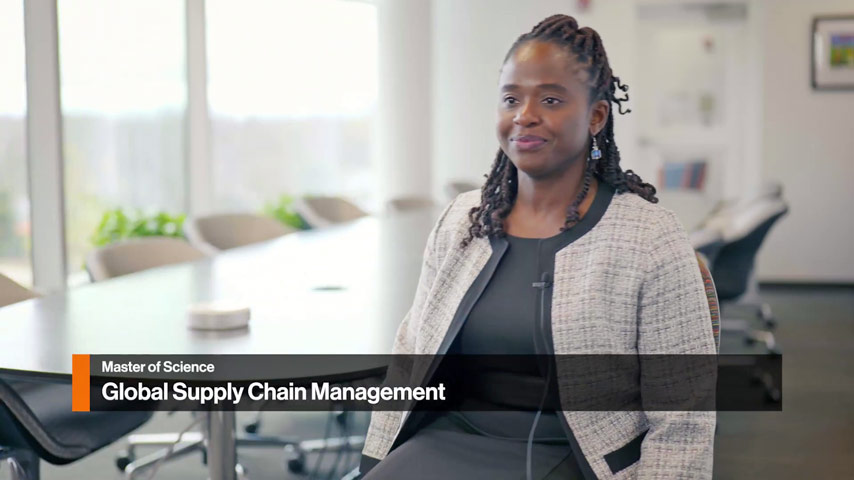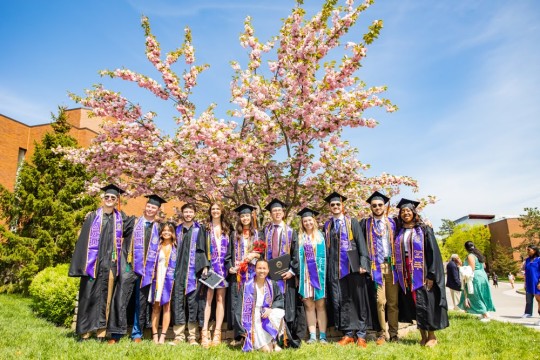Global Supply Chain Management Master of Science Degree

Global Supply Chain Management
Master of Science Degree
- RIT /
- Rochester Institute of Technology /
- Academics /
- Global Supply Chain Management MS
RIT’s master of global supply chain management prepares you for the complexities of global supply chains and to analyze sustainability, ethics, and the impact of emerging technologies.
$70K
Median First-Year Salary of RIT Graduates from this degree
Overview for Global Supply Chain Management MS
Why Study Global Supply Chains at RIT?
STEM-OPT Visa Eligible: The STEM Optional Practical Training (OPT) program allows full-time, on-campus international students on an F-1 student visa to stay and work in the U.S. for up to three years after graduation.
Incorporates a strong focus on the latest technologies and data analytics skills.
Provides hands-on experience and the ability to leverage technology for supply chain optimization and innovation.
Integrates concepts from supply chain, operations management, analytics, data visualization, industrial engineering, global business, and management.
Rooted in strong technology and analytical traditions of RIT’s Saunders College of Business, the supply chain management master’s is an interdisciplinary program that integrates concepts from supply chain, logistics, operations management, analytics, data visualization, industrial engineering, global business, sustainability, ethics, and risk management. Prepare for global career opportunities by gaining an understanding of cultural differences, global trade regulations, and logistics practices in different regions, while being adept at managing global supply chain networks.
The master of global supply chain management offers multiple opportunities to enhance your expertise and make you more competitive in your chosen career path. Gain a strong foundation in supply chain principles, an understanding of industry-specific practices, and familiarity with the latest trends and technologies.
What Will You Do With a Supply Chain Management Masters?
Products and services increasingly rely on a globally integrated supply system and the related technologies that enable the efficient movement of these good and services around the world. Supply chain management professionals are in demand to help companies manage the complex operations who can manage the complex operations that take a product from ideation, sourcing of materials, production, storage and transportation, to purchasing, order fulfillment, distribution, and inventory management.
The global supply chain needs to be efficient for companies to remain competitive internationally as they turn raw materials into consumer goods and services and deliver them to consumers. In RIT’s supply chain management masters, you will gain a comprehensive understanding of the global supply chain as you gain the analytical, quantitative, and leadership skills needed to design innovative solutions, predict future trends, and become a leader in the fast-moving business landscapes found in the global supply chain system.
 Play video: Global Supply Chain Management MS at RIT Saunders College, with professor Joy Olabisi
Play video: Global Supply Chain Management MS at RIT Saunders College, with professor Joy Olabisi
What to Expect in the Global Supply Chain Management program
-
Join us for Fall 2025
Many programs accept applications on a rolling, space-available basis.
-
30% Tuition Scholarship for NY Residents and Graduates
Now is the perfect time to earn your Master’s degree. If you’re a New York state resident with a bachelor’s degree or have/will graduate from a college or university in New York state, you are eligible to receive a 30% tuition scholarship.
-
Next Steps to Enroll
Accept your offer of admission and take the next steps toward becoming an RIT Tiger.
Careers and Experiential Learning
Typical Job Titles
| Demand Planner | Director of Supply Chain | Distribution Coordinator |
| Operations Analyst | Global Supply Chain Manager | Global Trade Compliance Manager |
| Inventory Manager | Logistics Manager | Operations Manager |
| Procurement Manager | Strategic Sourcing Manager | Supplier Relationship Coordinator |
| Supply Chain Analyst | Supply Chain Consultant | Supply Chain Manager |
| Transportation Coordinator | Transportation Manager | Vice President of Operations |
| Warehouse Coordinator |
Careers in Supply Chain Management
RIT’s global supply chain management degree prepares you for exciting jobs in supply chain management, which includes careers in planning and logistics, procurement, and sourcing, through comprehensive course work and real-world business projects.
Supply chain careers are based on different areas of specialization and can lead to diverse career opportunities. Further specialization and advancement opportunities are available based on industry, organization, and individual interests. Career pathways can focus on:
- Optimizing supply chain operations and improving overall efficiency
- Managing sourcing/supplier relationships to ensure cost-effective and reliable supply chain operations
- Strategic decision-making, supply chain design, and long-term planning, or even a combination of these.
You'll graduate with a management master’s ready to pursue top positions such as: transportation manager, financial analyst, logistics analyst, sourcing manager, purchasing manager, business intelligence analyst, or facilities manager.
The field of supply chain management is expected to experience continued growth in employment opportunities due to several factors including:
- Globalization and International Trade
- E-commerce and Omnichannel Retailing
- Technological and Automation Advancements
- Emerging Sustainability and Ethical Practices
- Supply Chain Risk Management
- Supply Chain Data and Analytics
The flexibility and relevance of our masters of global supply chain management means you are prepared for outstanding career opportunities in a range of positions. Our alumni are employed at diverse firms such as Carestream, Engineered Plastic Components, L3Harris, LSI Solutions, McKinsey & Company, Tesla, Wegmans, and more. Our Management Advisory Board helps you prepare for you career by ensuring our curriculum is continuously updated to meet employers' needs while providing networking and mentorship opportunities.
Cooperative Education and Internships
What makes an RIT education exceptional? It’s the ability to complete relevant, hands-on career experience. At the graduate level, and paired with an advanced degree, cooperative education and internships give you the unparalleled credentials that truly set you apart. Learn more about graduate co-op and how it provides you with the career experience employers look for in their next top hires.
Co-ops and internships take your knowledge and turn it into know-how. Business co-ops provide hands-on experience that enables you to apply your knowledge of business, management, finance, accounting, and related fields in professional settings. You'll make valuable connections between course work and real-world applications as you build a network of professional contacts.
Cooperative education is optional but strongly encouraged for graduate students in the global supply chain management program.
Featured Work and Profiles
-
Accenture, Bengaluru, Karnataka, India
Amshu Kowkrady ’21 "Every lecture, every interaction with the professors is enabling me to look at things in a new perspective, analyze and form opinions, learn by asking the right questions and is helping me to grow as...
Read More about Accenture, Bengaluru, Karnataka, India -
Research Insights: Variety’s Not Always the Spice of Life
Kevin Sweeney Product variety, operational performance, and sales
Read More about Research Insights: Variety’s Not Always the Spice of Life -
University of Arkansas, Fayetteville, AR
Sparsh Sinha ’23 "The emphasis on practical knowledge and the strength of the co-op program is what drew me to Saunders."
Read More about University of Arkansas, Fayetteville, AR -
Research Insights: Storms on the Horizon
Laharish Guntuka How supply chains are at risk from climate change.
Read More about Research Insights: Storms on the Horizon -
Research Insights: Follow the Leader—or Not
Ettore Spadafora How firms imitate market leaders in pursuing global strategies.
Read More about Research Insights: Follow the Leader—or Not -
Harris Corporation, Rochester, NY
Thomas J. Higgins III ’22 "The experiences and opportunities that the program at RIT has allowed me to experience are things I would have never experienced in life otherwise. My time at RIT has been extremely beneficial in...
Read More about Harris Corporation, Rochester, NY
Curriculum for 2024-2025 for Global Supply Chain Management MS
Current Students: See Curriculum Requirements
Global Supply Chain Management, MS degree, typical course sequence
| Course | Sem. Cr. Hrs. | |
|---|---|---|
| First Year | ||
| DECS-743 | Operations and Supply Chain Management |
3 |
Study of the management of operations and supply chain management. Encompasses both manufacturing and services. Topics include operations and supply chain strategy, ethical behavior, forecasting; work systems, inventory management, capacity and materials planning, lean operation, supply chain design and closed-loop supply chains, global operations, quality management, quality control, and quality improvement, project management; and current issues. (Prerequisites: DECS-782 or MGIS-650 or equivalent course.) Lecture 3 (Fall, Spring, Summer). | ||
| DECS-750 | Supply Chain Analysis |
3 |
This course provides an overview of quantitative supply chain modeling and analysis. Accordingly, this course will discuss several strategic, tactical, and operational concepts used in improving the distribution of goods and services throughout the supply chain. The course emphasis is on understanding when and how to use these mathematical programming and optimization methods as well as how to interpret the results for actionable information. (Prerequisites: DECS-743 or equivalent course.) Lecture 3 (Spring). | ||
| INTB-710 | Global Business Analytics |
3 |
This course is designed to help students, regardless their backgrounds, to identify global business opportunities, possess necessary analytical skills to evaluate these opportunities, and understand the strategies to explore these opportunities to serve transnational businesses’ goals. Students will be exposed to a variety of analytical skill sets such as collecting and analyzing institutional and primary international business data, reading the multinational firm-level data and understanding how global expansion impacts firms’ bottom lines, developing foreign exchange hedging strategies, and apprehending the basic practices of international trade and foreign investment. (This class is restricted to degree-seeking graduate students or those with permission from instructor.) Lecture 3 (Fall). | ||
| INTB-755 | Export, Import, and Global Sourcing |
3 |
Exporting, importing, global sourcing and cross-border investing practice is detailed-oriented and complex. Market forces and government regulations create challenges and opportunities to move goods, services and capital between nations. Students will study issues of compliance, risk assessment and management, analyze international information, understand logistics and intermediaries, and management of international payments and financing. Students will be able to apply their knowledge and skills to the practice of cross border transactions. Lecture 3 (Fall, Spring). | ||
| MGMT-755 | Negotiations |
3 |
This course is designed to teach the art and science of negotiation so that one can negotiate successfully in a variety of settings, within one's day-to-day experiences and, especially, within the broad spectrum of negotiation problems faced by managers and other professionals. Individual class sessions will explore the many ways that people think about and practice negotiation skills and strategies in a variety of contexts. Lecture 3 (Fall, Spring). | ||
Global Supply Chain Management Electives |
12 | |
| Choose one of the following: | 3 |
|
| MGMT-791 | Graduate Project |
|
This course is used to fulfill the graduate project requirement for the MS degree in management. The candidate must obtain approval from an appropriate faculty member to supervise the paper before registering for this course. A corporate-oriented research project designed by the candidate and his or her advisor to explore a salient management-related issue. (This course is restricted to MGMT-MS Major students.) Project (Spring, Summer). | ||
| MGMT-790 | Field Exam Prep, plus one (1) Global Supply Chain Management Elective |
|
All MS-Management students who do not complete a capstone project will take a field exam at the end of their program. This course provides basic help to students taking this exam. *Note: All required courses in the MS-Management program. (This course is restricted to MGMT-MS Major students.) Comp Exam 3 (Fall, Spring, Summer). | ||
| Total Semester Credit Hours | 30 |
|
Global Supply Chain Management Electives
| Choose at least two of the following (6-9 credits): | ||
| BANA-780 | Advanced Business Analytics |
|
This course provides foundational, advanced knowledge in the realm of business analytics. Advanced topics such as machine learning, analysis of structured data, text mining, and network analysis are covered. Industry standard tools such as R and Python are extensively used in completing student projects. (Prerequisite: BANA-680 or equivalent course.) Lecture 3 (Spring). | ||
| DECS-744 | Project Management |
|
A study in the principles of project management and the application of various tools and techniques for project planning and control. This course focuses on the leadership role of the project manager, and the roles and responsibilities of the team members. Considerable emphasis is placed on statements of work and work breakdown structures. The course uses a combination of lecture/discussion, group exercises, and case studies. (This class is restricted to degree-seeking graduate students or those with permission from instructor.) Lecture 3 (Fall, Spring). | ||
| DECS-745 | Quality Control and Improvement |
|
| ISEE-682 | Lean Six Sigma Fundamentals |
|
This course presents the philosophy and methods that enable participants to develop quality strategies and drive process improvements. The fundamental elements of Lean Six Sigma are covered along with many problem solving and statistical tools that are valuable in driving process improvements in a broad range of business environments and industries. Successful completion of this course is accompanied by “yellow belt” certification and provides a solid foundation for those who also wish to pursue a “green belt.” (Green belt certification requires completion of an approved project which is beyond the scope of this course). (This course is restricted to degree-seeking graduate students and dual degree BS/MS or BS/ME students in KGCOE.) Lecture 3 (Fall, Spring, Summer). | ||
| MGIS-725 | Data Management and Analytics |
|
This course discusses issues associated with data capture, organization, storage, extraction, and modeling for planned and ad hoc reporting. Enables student to model data by developing conceptual and semantic data models. Techniques taught for managing the design and development of large database systems including logical data models, concurrent processing, data distributions, database administration, data warehousing, data cleansing, and data mining. Lecture 3 (Spring). | ||
| MGIS-760 | Integrated Business Systems |
|
This course focuses on the concepts and technologies associated with Integrated Business Information Systems and the managerial decisions related to the implementation and ongoing application of these systems. Topics include business integration and common patterns of systems integration technology including enterprise resource planning (ERP), enterprise application integration (EAI) and data integration. The key managerial and organizational issues in selecting the appropriate technology and successful implementation are discussed. Hands-on experience with the SAP R/3 system is utilized to enable students to demonstrate concepts related to integrated business systems. (familiarity with MS Office suite and Internet browsers) Lecture 3 (Spring). | ||
| MKTG-768 | Marketing Analytics |
|
This course provides an overview of marketing analytics in the context of marketing research, product portfolios, social media monitoring, sentiment analysis, customer retention, clustering techniques, and customer lifetime value calculation. Students will be introduced to, mathematical and statistical models used in these applications and their implementation using statistical tools and programming languages such as SAS, SPSS, Python and R. Multiple data sources will be used ranging from structured data from company databases, scanner data, social media data, text data in the form of customer reviews, and research databases. Students will complete guided projects using real time data and make effective use of visualization to add impact to their reports. There are no listed pre or co-requisites; however, instructor permission is required – student aptitude for quantitative work will be assessed; waived for students enrolled in quantitative programs such as the MS-Computational Finance which have pre-requisites in the areas of calculus, linear algebra, and programming. Lecture 3 (Spring). | ||
| Choose at least one of the following (3-6 credits): | ||
| MGMT-710 | Managing for Environmental Sustainability |
|
Environmental sustainability means satisfying today's ecological needs without compromising the ability to meet tomorrow's needs. This course will examine how firms can use sustainable practices, such as pollution prevention and green design, and still be successful in a competitive marketplace. The course will look at the concept of environmental sustainability and the current state of social and political pressures for more sustainable business practices. It will also explore successful sustainable business strategies, and the management processes needed to support them. Lecture 3 (Spring). | ||
| MGMT-735 | Management of Innovation |
|
This course addresses the management of innovation, sustainable technology, and the importance of technology-based innovation for the growth of the global products and services industries. The course integrates three major themes: (1) leading-edge concepts in innovation, (2) the role of technology in creating global competitive advance in both product-based and services-based industries, and (3) the responsibility of businesses related to sustainability. The importance of digital technology as an enabler of innovative services is covered throughout the course. (completion of four graduate business courses) Lecture 3 (Fall, Spring, Summer). | ||
| MGMT-740 | Leading Teams in Organizations |
|
This course examines why people behave as they do in organizations and what managers can do to improve organizational performance by influencing people's behavior. Students will learn a number of frameworks for diagnosing and dealing with managerial challenges dynamics at the individual, group and organizational level. Topics include leadership, motivation, team building, conflict, organizational change, cultures, decision making, and ethical leadership. Lecture 3 (Fall, Spring, Summer). | ||
| MKTG-761 | Marketing Concepts and Commercialization |
|
An introduction to contemporary principles and practices of marketing. The course is structured around the process of marketing planning leading to the development of successful marketing strategies, including the commercialization of products and services in domestic and international environments. Focus is on environmental scanning techniques, setting and evaluating measurable objectives, innovating and controlling the interrelated components of product/service offering, planning and executing the marketing mix (channels of distribution, price, and promotion), and enhancing customer relationships through the delivery of customer value. Lecture 3 (Fall, Spring, Summer). | ||
| MKTG-762 | Strategic Marketing Management |
|
This course is an advanced study of the strategic and operational decisions facing a marketing executive today. Topics covered include market segmentation, branding and positioning, channel management, strategic pricing, marketing communications, marketing analytics and marketing in the new social economy. The course will present various concepts and tools for evaluating the marketplace (external environment, competitors, marketing opportunities and threats), and analyzing marketing strategies. Time will be spent on developing, evaluating and implementing marketing strategy at the corporate level using case analysis and formal decision making techniques. Students will be expected to make use of analytical, problem solving and communication skills to drive the development of a marketing plan focused on an actual company. The course also includes a business simulation with emphasis on advanced marketing management skills (Capsim: Capstone). The course will weave together a study of classical marketing theory and strategic planning with applied marketing management skills within the context of a business simulation. (Prerequisites: MKTG-761 or equivalent course.) Lecture 3 (Spring). | ||
Students are also interested in
Admissions and Financial Aid
This program is available on-campus only.
| Offered | Admit Term(s) | Application Deadline | STEM Designated |
|---|---|---|---|
| Full‑time | Fall | Rolling | Yes |
| Part‑time | Fall or Spring | Rolling | No |
Full-time study is 9+ semester credit hours. Part-time study is 1‑8 semester credit hours. International students requiring a visa to study at the RIT Rochester campus must study full‑time.
Application Details
To be considered for admission to the Global Supply Chain Management MS program, candidates must fulfill the following requirements:
- Complete an online graduate application.
- Submit copies of official transcript(s) (in English) of all previously completed undergraduate and graduate course work, including any transfer credit earned.
- Hold a baccalaureate degree (or US equivalent) from an accredited university or college. A minimum cumulative GPA of 3.0 (or equivalent) is recommended.
- Submit a current resume or curriculum vitae.
- Submit a personal statement of educational objectives.
- Letters of recommendation are optional.
- Entrance exam requirements: GRE or GMAT required for individuals with degrees from international universities. No minimum score requirement.
- Submit English language test scores (TOEFL, IELTS, PTE Academic), if required. Details are below.
English Language Test Scores
International applicants whose native language is not English must submit one of the following official English language test scores. Some international applicants may be considered for an English test requirement waiver.
| TOEFL | IELTS | PTE Academic |
|---|---|---|
| 88 | 6.5 | 60 |
International students below the minimum requirement may be considered for conditional admission. Deaf and hard-of-hearing test takers with significant hearing loss do not need to take the listening and speaking sections for the TOEFL and IELTS. Each program requires balanced sub-scores when determining an applicant’s need for additional English language courses.
How to Apply Start or Manage Your Application
Cost and Financial Aid
An RIT graduate degree is an investment with lifelong returns. Graduate tuition varies by degree, the number of credits taken per semester, and delivery method. View the general cost of attendance or estimate the cost of your graduate degree.
A combination of sources can help fund your graduate degree. Learn how to fund your degree
Related News
-
August 7, 2024

Global Supply Chain Management Graduates Provide Leadership to Stay Ahead of Industry Trends
The interdisciplinary, STEM-designated global supply chain management (GSCM) master of science program at Saunders College of Business provides the analytical, quantitative, and leadership skills required to excel in this fast-paced environment.
-
June 13, 2024

Saunders Graduate Programs Ranked by Eduniversal 2024
Saunders College of Business continues to be a leader in graduate programs nationally and internationally.
-
May 29, 2024

2023-24 Alumni News and Recognitions
Submit your latest career move or latest achievement to communications@saunders.rit.edu.
Contact
- Delaney Ball
- Assistant Director
- Office of Graduate and Part-Time Enrollment Services
- Enrollment Management
- 585‑475‑6933
- Delaney.Ball@rit.edu
- Matthew Cornwell
- Associate Director of Student Services
- Student Services
- Saunders College of Business
- 585‑475‑6916
- mcornwell@saunders.rit.edu
Saunders College of Business






















